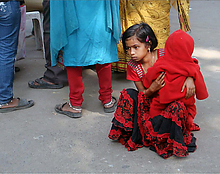Mihai Pop Co-Leads Team Investigating Diarrheal Diseases in Young Children

Mihai Pop, an associate professor of computer science in the Center for Bioinformatics and Computational Biology, co-led a team of researchers that recently concluded a major study of diarrheal pathogens in young children from low-income countries.
The researchers used high-throughput 16S rRNA genomic sequencing to examine both “good” and “bad” microbiota -- the tens of trillions of microbes that inhabit the human intestinal system -- in samples taken from 992 children in Bangladesh, The Gambia, Kenya and Mali under the age of 5 who were suffering from moderate to severe diarrhea (MSD).
MSD is a major cause of childhood mortality in developing countries and ranks as one of the top four causes of death amongst young children in sub-Saharan Africa and South Asia.
Pop, who also has an appointment in UMIACS, and O. Colin Stine, a professor of epidemiology and public health at the University of Maryland School of Medicine, led a team of almost three-dozen researchers in the six-year project funded by $10.1 million from the Bill & Melinda Gates Foundation.
The researchers were able to identify statistically significant disease associations with several organisms already implicated in diarrheal disease, such as members of the Escherichia/Shigella genus and Campylobacter jejuni. They also found correlation between MSD and organisms previously not widely believed to cause the condition, including Streptococcus and Granulicatella.
More importantly, the genomic sequencing revealed a possible protective role that certain microbiota can have against diarrhea when Prevotella genus and Lactobacillus ruminis were found in the samples.
The results are available in a paper published in Genome Biology, a peer-reviewed scientific journal focused on the dissemination, discussion and critical review of biology informed by genomic research.
Pop and Stine expect to conduct further genomic and epidemiological studies to assess the potential development of diet- or microbiological-based therapeutics.
The longstanding scientific collaboration between the two researchers is enhanced by the MPowering the State strategic partnership, launched in 2011 to support collaborative research and education between the state’s top two public research institutions, the University of Maryland, College Park and the University of Maryland, Baltimore.
